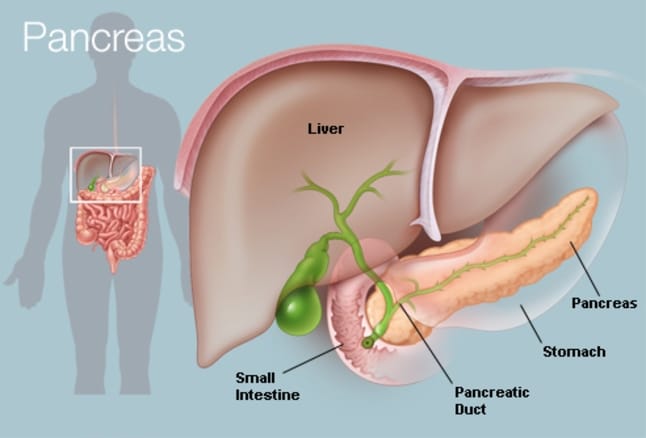Can you live without a pancreas? – Overview
The pancreas is both a digestive organ and an endocrine gland. As a digestive organ, it produces enzymes that break down carbohydrates, proteins and fats in the small intestine.
As an endocrine gland, it produces the hormones insulin and glucagon, which help in regulating the blood sugar level.
The pancreas is located in the abdomen.
There may be a need to remove the pancreas in some circumstances due to recurrent infection or cancer and the patients may wonder, “Can you live without a pancreas?”. The answer to that question is ‘Yes, you can live without a pancreas.
Given the importance of the pancreas as an organ, you might think living without one is impossible – like trying to live without a brain. But you can live without a pancreas.
Thanks to advancements in medicine and the technology with which to administer it, we can now more effectively than ever reproduce what the pancreas does when it becomes necessary to remove all or part of the organ because of pancreatic cancer or other pancreatic diseases.
Structure of the Pancreas

Can you live without a pancreas?
The pancreas is an elongated 12-15 cm long organ consisting of the head, body and tail. It is located posterior to the stomach, with its head in the curve of the duodenum. The body and tail extend laterally. The tail touches the spleen.
Functions of Pancreas
The pancreas plays important role in food digestion and blood sugar control.
1. Food digestion
The pancreas plays a vital role in the digestive system. It does this by secreting a fluid that contains digestive enzymes into the small intestine. These enzymes help to break down carbohydrates, proteins and lipids (fats).
The enzymes include:
- trypsin and chymotrypsin to digest proteins
- amylase to break down carbohydrates
- lipase, to break down fats into fatty acids and cholesterol
2. Blood sugar control
Cells within the pancreas help to maintain blood sugar levels (homeostasis). They do this by producing two glucose-regulating hormones, insulin and glucagon.
When the blood sugar (glucose) level is too high, insulin is released, which helps convert the excess glucose into glycogen stored in the body. Conversely, when the blood sugar level is too low, glucagon is released to convert the stored glycogen into glucose.
Thus, the pancreas plays a very critical role in controlling the level of glucose in the blood.
Indications for Pancreas Removal
A pancreatectomy is a surgical procedure that partially or completely removes the pancreas.
There is a need for the removal of the pancreas under the following circumstances:
1. Pancreatic cancer – If the pancreas becomes cancerous, there may be the need for the pancreas to be removed before it spreads to other vital parts of the body. As you can live without your pancreas, it is better to remove the spleen before cancer spreads to other organs you can’t live without.
2. Pancreatitis – This refers to inflammation of the pancreas. There are two main types, acute pancreatitis and chronic pancreatitis. Signs and symptoms of pancreatitis include pain in the upper abdomen, nausea, and vomiting.
The pain often goes into the back and is usually severe. In acute pancreatitis, a fever may occur and symptoms typically resolve in a few days. In chronic pancreatitis, weight loss, fatty stool, and diarrhea may occur.
Complications may include infection, bleeding, diabetes mellitus, or problems with other organs. Pancreas removal may be indicated concerning chronic, long-term pancreatitis.
3. Trauma – Severe blow to the pancreas may also necessitate pancreatectomy.
Outlook
After the removal of the pancreas, the body no longer produces its insulin or pancreatic enzymes, so patients have to take insulin and enzyme supplements.
Those who were not already diabetic become so. Blood sugar control is challenging even for relatively young and healthy people without a pancreas, owing to the digestive challenges of not having endogenous insulin and pancreatic enzymes under autonomic control. It can be insurmountably challenging depending on age and comorbidities.
Nevertheless, with proper medical care, lifestyle and diet changes, and a commitment to taking insulin as needed, it is possible to lead a relatively normal and healthy life.
You can live without your pancreas and your spleen and gallbladder if they’ve also been removed. You can also live without organs like your appendix, colon, kidney, and uterus and ovaries (if you’re a woman).
However, you’ll need to make some adjustments to your lifestyle. Take the medicines your doctor prescribes, monitor your blood sugar, and stay active.
More: Jaw Reduction Surgery


